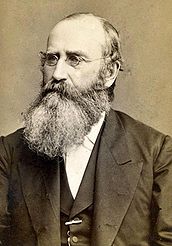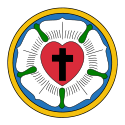- Charles Porterfield Krauth
-
Charles Porterfield Krauth (March 17, 1823 – January 2, 1883) was a pastor, theologian and educator in the Lutheran branch of Christianity. He is a leading figure in the revival of the Lutheran Confessions connected to Neo-Lutheranism in the United States.
Contents
Education and parish ministry
He was born in Martinsburg, Virginia. Krauth graduated from Gettysburg College (then called Pennsylvania College) in 1839, while his father Charles Philip Krauth was president of that school, and the Lutheran Theological Seminary at Gettysburg in 1841. From 1841-1852, he served congregations in Baltimore, Maryland, Martinsburg, and Winchester, Virginia. During the winter of 1853-53, he briefly served the Dutch Reformed congregation in Saint Thomas in the Virgin Islands. Upon his return to the United States, he was called to congregations in Pittsburgh from 1855 to 1859, and Philadelphia from 1859 to 1861.
The Confessional Revival
In 1861, Krauth resigned from parish ministry to serve full-time as editor of The Lutheran, a theological journal. One of The Lutheran’s goals was to restore the confessions of faith found in the Book of Concord to prominence in Lutheran church life.
These documents, especially the Augsburg Confession, have always been identified as the cornerstones of a distinctively Lutheran theological identity. But during the eighteenth and nineteenth centuries, Lutherans in the United States had interpreted the confessions very loosely. A key figure in this movement was Samuel Simon Schmucker, one of Krauth’s professors at Gettysburg, whose “American Lutheranism” as outlined in the Definite Synodical platform of 1855, proposed that the Augsburg Confession was mistaken on such questions as Baptismal Regeneration and the Real Presence in the Eucharist.
In contrast, Krauth and his collaborators (who eventually included his own father and Beale Melanchthon Schmucker, the son of Samuel Simon) preferred a more literal reading of the Lutheran Confessions. They saw Martin Luther’s theology not as a radical rejection of traditional patristic and medieval theology, but as an essentially conservative return to first principles. In both theology and worship, they sought to create Lutheranism in which the medieval heritage was more readily apparent than the Enlightenment adaptations. For example, one of Krauth’s major books, “The Conservative Reformation and its Theology,” is an extended defense of the Real Presence.
Krauth was personally influenced by his reading of the Mercersburg theologians, John Williamson Nevin and Philip Schaff, who had attempted a similar repristination of Calvinist theology within the American branch of the German Reformed Church. Nevin and Schaff had called themselves “evangelical catholics,” a term which has come to be used rarely, if at all, among the Reformed churches, but quite commonly among Lutherans. (Church, 226-229).
Similar revival movements like Neo-Lutheranism took place in the early nineteenth century among Roman Catholics and Anglicans, as for example in Guéranger’s re-founding of the abbey at Solesmes, and in the Oxford Movement. (Franklin, passim.) In European Lutheranism as well, this revival was carried out by theologians and pastors such as Wilhelm Loehe.
The General Council
Conflict between the “American Lutherans” and the leaders of the confessional revival led to a schism. In 1864, Krauth was asked to lead the new seminary in Philadelphia, which was founded by churches of the Pennsylvania Ministerium to rival the seminary in Gettysburg (now known as the Lutheran Theological Seminary at Philadelphia). In 1867, they founded the General Council of the Evangelical Lutheran Church in America (usually known simply as General Council). It was composed of seven regional bodies which had withdrawn from the General Synod.
As the first professor of systematic theology at the new seminary, Krauth was at the intellectual center of the General Council. He was the author of its Fundamental Articles of Faith and Church Polity, as well as of the constitution for its congregations. His liturgical scholarship guided the formation of General Council worship materials. From 1868, Krauth also served as professor of mental and moral philosophy at the University of Pennsylvania, and from 1873 as vice-provost.
One of Krauth’s most controversial acts was to prepare a series of theses on pulpit and altar fellowship. Called the “Akron-Galesburg Rule,” these may be summarized as saying “Lutheran pulpits are for Lutheran ministers only, and Lutheran altars are for Lutheran communicants only.” Although Krauth’s Rule permitted exceptions, it was nonetheless a strong repudiation of the broad ecumenical relationships pursued by the General Synod.
References
Bowden, Henry Warner. Dictionary of American Religious Biography. Westport, CT:Greenwood, Press, 1977. ISBN 0-8371-8906-3.
Church, Michael. “A Beautiful and Right Praxis: the Ecclesiology of the Common Service,” in Essays and Reports of the Lutheran Historical Conference (1998), vol. 18.
Franklin, R.W. Three Nineteenth-Century Churches: the History of a New Catholicism in Wuerttenburg, England and France. New York and London, Garland Publishing: 1987.
Nelson, E. Clifford. The Lutherans in North America, revised ed. Philadelphia: Fortress, 1980.
Spaeth, Adolph. “Krauth, Charles Porterfield,” article in H.E. Jacobs, ed., The Lutheran Cyclopedia. New York Scribner’s, 1899.
External links
- Charles Porterfield Krauth: The American Chemnitz (PDF) by The Revd. Prof. David Jay Webber
- The Conservative Reformation and Its Theology by Charles Porterfield Krauth
- Krauth, Charles Porterfield. The Conservative Reformation and Its Theology: As Represented in the Augsburg Confession and in the Literature of the Evangelical Lutheran Church. Philadelphia: J. B. Lippincott & Co., 1875. (Google Books)
- Bente, F. American Lutheranism Volume II St. Louis: Concordia Publishing House. 1919.
- Wolf, Edmund Jacob. The Lutherans in America; a story of struggle, progress, influence and marvelous growth. New York: J.A. Hill, 1889.
- Charles Porterfield Krauth 1823-1883 from The Cyber Hymnal
- Spaeth, Adolph. Charles Porterfield Krauth Vol. 1 New York: The Christian Literature Company. 1898 (Google Books)
Confessional Lutheran Revivals Awakening J.G. Hamann · Paul Henkel · Hans Nielsen Hauge · Haugeanism · Paavo Ruotsalainen · Finnish Awakening · Claus Harms · Lars Levi Læstadius · Laestadianism · Carl Olof Rosenius · N.F.S. Grundtvig · Friedrich TholuckOld Lutheran GermanySchism of the Old Lutherans · Background · J.G. Scheibel · Eduard Huschke · Henrik Steffens · H.E.F. Guericke · G.P.E. Huschke · Free churchesAustralia and Papua New GuineaUnited States of AmericaMartin Stephan · J.A.A. Grabau · Wilhelm Sihler · F.C.D. Wyneken · C. F. W. Walther · H.A. Preus · Synodical Conference of North AmericaNeo-Lutheran Repristination SchoolErlangen SchoolG.C.A. von Harless · J.W.F. Höfling · Gottfried Thomasius · J.C.K. von Hofmann · Franz Delitzsch · K.F.A. Kahnis · Theodosius Harnack · C.E. Luthardt · F.H.R. von Frank · Paul Althaus · Werner ElertA.F.C. Vilmar · F.J. Stahl · A.F.O. Münchmeyer · J.K.W. Löhe · Theodor Kliefoth · Heinrich Hansen · High Church Union of the Augsburg ConfessionPortal Categories:- American Lutherans
- American magazine publishers (people)
- Lutheran hymnwriters
- People from Gettysburg, Pennsylvania
- People from Martinsburg, West Virginia
- University of Pennsylvania faculty
- 1823 births
- 1883 deaths
Wikimedia Foundation. 2010.


